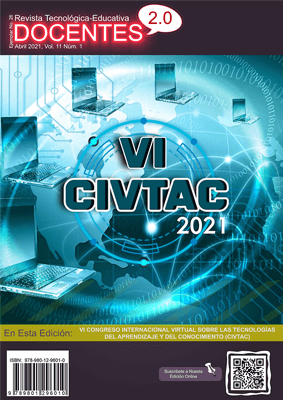Cognitive and Affective Empathy in Psychology Students During the Rigid Ruarantine by Covid-19
 DOI:
https://doi.org/10.37843/rted.v11i1.193
DOI:
https://doi.org/10.37843/rted.v11i1.193
Main Article Content
Abstract
In the training processes, it is necessary to reinforce empathy, which is considered a fundamental aspect and sufficiently relevant to be considered for its evaluation in a specific way. The present research studied the effects of rigid quarantine on empathic capacity from a cognitive and affective approach, both in assessing the empathic process and in the interpretation of its four specific scales: adoption of perspectives, emotional understanding, empathic stress, and joy. In psychology, students are in the middle of their professional training within a private university. The study was based on the quantitative approach, which contemplates a contemporary transactional descriptive research design and uses a discretionary non-probabilistic sample. For the present investigation, the students who were recurrent in their participation in virtual classes were selected. The information collection was through applications of the Cognitive and Affective Empathy Test; the study was carried out during rigid pandemic quarantine by Covid-19. The items were transcribed into an electronic form, using Microsoft Forms tools, after contextualizing and adapting them to the Bolivian context. It identified that the pandemic situation affected the empathic characteristics of the students, mainly: the ability to put one in the other's shoes, as well as the ability to share the positive emotions of another person.
Downloads
Metrics
Article Details

This work is licensed under a Creative Commons Attribution-NonCommercial-NoDerivatives 4.0 International License.
Those authors who have publications in our journal accept the following terms:
- When a work is accepted for publication, the author retains rights of reproduction, distribution of his/her article for exploitation in all countries of the world in the format provided by our magazine and any other magnetic medium, optical, and digital.
- Authors will retain their copyright and guarantee the journal the right first to publish their work, which will be simultaneously subject to the Creative Commons Acknowledgment License (Attribution-NonCommercial-NoDerivatives 4.0 International (CC BY-NC-ND 4.0)). That allows third parties to copy and redistribute the material in any medium or format, under the following conditions: Acknowledgment - You must properly acknowledge authorship, provide a link to the license, and indicate if any changes have been made. You may do so in any reasonable way, but not in a way that suggests you have the licensor's endorsement or receive it for your use. NonCommercial - You may not use the material for a commercial purpose. NoDerivatives - If you remix, transform, or build from the material, you cannot broadcast the modified material. There are no additional restrictions - You cannot apply legal terms or technological measures that legally restrict you from doing what the license allows.
- Authors may adopt other non-exclusive license agreements to distribute the published version of the work (e.g., deposit it in an institutional archive or publish it in a monographic volume) provided that the initial publication in this journal is indicated.
- Authors are allowed and recommended to disseminate their work through the Internet (e.g., in institutional telematic archives, repositories, libraries, or their website), producing exciting exchanges and increasing the published work's citations.
- Request of withdrawal an article has to be done in writing by the author to the Editor, becoming effective after a written response from the Editor. For this purpose, the author or authors will send correspondence via e-mail: [email protected].
- The author will not receive financial compensation for the publication of his work.
- All Docentes 2.0 Journal publications are under the Open Journal System (OJS) platform at: https://ojs.docentes20.com/.
References
Álvarez, P., Carrasco, M., & Fustos, J. (2010). Relación de la empatía y género en la conducta prosocial y agresiva, en adolescentes de distintos tipos de establecimientos educacionales. Revista Iberoamericana De Psicología, 3(2), 27-36. https://doi.org/10.33881/2027-1786.rip.3203
Álvarez-Ovallos, A., Gélvez-López, A., & Mosquera-Téllez, J. (2020). Conflicto Escolar en la Educación Rural del Nororiente de Colombia. Revista Tecnológica-Educativa Docentes 2.0, 9(2), 5-15. https://doi.org/10.37843/rted.v9i2.135 DOI: https://doi.org/10.37843/rted.v9i2.135
Angulo, G., Guerra, V., Blanco, Y., & Méndez, T., (2019). Características de la comprensión emocional en escolares cubanos de 8-10 años. Perspectc, Educ. Vol 58. N°3. Pontificia Universidad Católica del Valparaiso. http://dx.doi.org/10.4151/07189729-vol.58-iss.3-art.843 DOI: https://doi.org/10.4151/07189729-Vol.58-Iss.3-Art.843
Balart, M. (2013). La empatía, la clave para conectar con los demás, Observatorio de recursos humano. 79, 86-87. http://www.gref.org/nuevo/articulos/art_250513.pdf
Batson, C. (1987). Prosocial motivation: Is it every truly altruistic? In L. Berkowitz (Ed.), Advances in experimental social psychology. Vol. 20, pp.65-122. San Diego, CA: Academic Press. DOI: https://doi.org/10.1016/S0065-2601(08)60412-8
Bisquera, R. (2016). 19 ideas clave Educación Emocional. Graó.
Castillo, P. (2012) Nivel de empatía de los estudiantes practicantes de psicología clínica (Estudio realizado con estudiantes practicantes de licenciatura en psicología clínica de la Universidad Rafael Landívar y Mariano Gálvezn [Tesis de Licenciatura, Universidad Nacional de Colombia]. http://biblio3.url.edu.gt/Tesis/2012/05/42/Castillo-Pedro.pdf
Diaz, V. (2014). Empatía en estudiantes de enfermería de la Universidad mator, Sede Temuco, IX región chile. vol.14, n.3, pp.388-402. ISSN 1657-5997. http://dx.doi.org/10.5294/aqui.2014.14.3.9. DOI: https://doi.org/10.5294/aqui.2014.14.3.9
Hernández, R., & Mendoza, C. (2018). Metodología de la investigación: Las rutas cuantitativa, cualitativa y mixta. Universidad de Celaya.
Hurtado, J. (1998). Metodología de la Investigación Holística. Instituto Universitario de Tecnología Caripito.
López, B., Fernández, I., & Abad, F. (2008). Test de Empatía Cognitiva y Afectiva. TEA Ediciones.
Peng, W., Lee, M., & Heeter, C. (2010). The effects of a serious game on role-taking and willingness to help. Journal of Communication, 60(4), 723-742. DOI: https://doi.org/10.1111/j.1460-2466.2010.01511.x
Requena, B. (2014). Muestreo no probabilístico, https://www.universoformulas.com/estadistica/inferencia/muestreo-no-probabilistico/
Reyes, M., & Rodríguez, H. (2018). La adopción de perspectiva y la comunicación de la responsabilidad social corporativa: una revisión conceptual. Vol. XXVI (2), 99-114. https://doi.org/10.18359/rfce.2888 DOI: https://doi.org/10.18359/rfce.2888
Tintaya, P. (2014). Proyecto de investigación. Instituto de Estudios Bolivianos.






